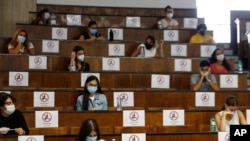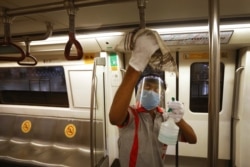The U.N. children’s agency said Thursday it would lead the world's largest and fastest procurement and distribution of COVID-19 vaccines from dozens of makers in the next two years so that no country lacks access.
UNICEF and the World Health Organization co-lead a COVID-19 vaccine allocation plan known as COVAX.
Seventy-six wealthy nations are part of the COVAX plan, which aims to buy and provide equitable access worldwide to the shots for 92 low- and lower-middle-income countries, according to a UNICEF statement.
“This is an all-hands on deck partnership between governments, manufacturers and multilateral partners to continue the high-stakes fight against the COVID-19 pandemic,” Henrietta Fore, UNICEF executive director, said in a statement. “In our collective pursuit of a vaccine, UNICEF is leveraging its unique strengths in vaccine supply to make sure that all countries have safe, fast and equitable access to the initial doses when they are available.”
In August, WHO Director-General Tedros Adhanom Ghebreyesus warned of possible vaccine hoarding by wealthier nations, saying such actions would worsen the effects of the pandemic.
He pushed for the creation of the COVAX Global Vaccines Facility as way to share COVID-19 vaccines with developing countries. More than 170 countries have agreed to take part.
On Wednesday, the United States said it would not participate in the global initiative because the World Health Organization is taking a leading role in the effort.
White House spokesman Judd Deere issued a statement saying the United States "will continue to engage our international partners to ensure we defeat this virus, but we will not be constrained by multilateral organizations influenced by the corrupt World Health Organization and China."
President Donald Trump announced in July that he was withdrawing the United States from WHO, claiming the agency mishandled the outbreak and showed deference to China, where the virus was first detected late last year.
In addition to UNICEF and the WHO, COVAX is being supported by the Coalition for Epidemic Preparedness Innovations, and Gavi, the Vaccine Alliance, which was founded by the Bill and Melinda Gates Foundation to vaccinate children in the world's poorest countries.
Twenty-eight COVID-19 makers shared production plans with UNICEF, which said in a market assessment “that manufacturers are willing to collectively produce unprecedented quantities of vaccines over the coming 1-2 years,” according to a report by Reuters news service.
The drugmakers, however, said production levels are “highly dependent” on the success of clinical trials, according to Reuters.
According to Johns Hopkins University statistics, as of Thursday there were more than 26 million confirmed cases of COVID-19, the disease caused by the coronavirus, and 867,219 deaths.
Also Thursday, Amnesty International said 1,320 health workers in Mexico have died from the coronavirus pandemic, the worst for any country in the world.
Amnesty’s report highlighted the deadly toll COVID-19 has had on frontline workers. Overall, at least 7,000 health workers have died of the virus.
Other countries with high mortality rates include the United States, Brazil and India, where health worker death tolls stand at 1,077, 634 and 573, respectively, Reuters reported. The three countries have the highest number of deaths and confirmed cases of COVID-19, according to Johns Hopkins.
Mexico ranks eighth in the world with 616,894 confirmed cases, but fourth overall in deaths, with 66,329.
According to a Reuters analysis of data from the Mexican government, health care workers in that country are four times more likely to die than in the U.S.
"Many months into the pandemic, health workers are still dying at horrific rates in countries such as Mexico, Brazil and the USA," Steve Cockburn, head of Economic and Social Justice at Amnesty International, told Reuters. "There must be global cooperation to ensure all health workers are provided with adequate protective equipment, so they can continue their vital work without risking their own lives."
Brazilian President Jair Bolsonaro, who was diagnosed with COVID-19 and has downplayed the severity of the coronavirus outbreak, said Thursday Brazilians will not be forced to receive a vaccination, when they become available.
Brazil on Thursday tallied more than 4 million confirmed cases of COVID-19 and is second in the world with 124,614 deaths.
"Many people want the vaccine to be applied in a coercive way, but there is no law that provides for that," Bolsonaro said in a Facebook live chat with his supporters, according to a Reuters report.
Several COVID-19 vaccines are being tested in Brazil. The government has bought 30 million doses of a vaccine that is being produced by Oxford University/AstraZeneca. Three others are in Phase 3 clinical trials from makers Sinovac Biotech of China, Pfizer Inc. and BioNTech, and Johnson & Johnson’s pharmaceutical subsidiary Janssen, according to Reuters.







